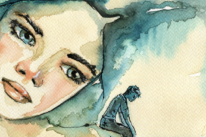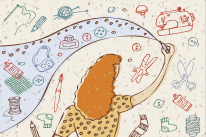
“We must accept finite disappointment, but never lose finite hope.” ~Martin Luther King Jr.
“You have to get out the whining,” my writing teacher told me, peering over a section of manuscript that dripped with self-loathing and pity. I swear I watched the words “Barren, empty, hollow shell…” fall flat to the floor and make the saddest plopping noise.
Those words haunted me for years; they still do sometimes when I get a baby shower invitation or walk by miniature sneakers at the GAP. Miniature sneakers dwell in the most emotional-scar-tissue-filled regions of my heart.
When I was twelve years old I learned that I would never be able to have children of my own. Thanks to a rare-ish genetic mutation of the second X chromosome, I had what the doctors labeled “premature ovarian failure” due to Turner Syndrome.
Turner girls may see all sorts of symptoms that range from barely noticeable to potentially fatal (though fortunately, that’s pretty infrequent).
Learning this was the result of many tests to figure out why I only came up to the seven-year-old line on the growth chart, or maybe why I hadn’t started my menstrual cycle, or had chronic ear infections, or excessive beauty marks—all tell tale symptoms.
When you’re twelve, having children is the furthest thing from your mind. Hover crafts and teleporting might be more of a reality than having actual human beings you are responsible for, with needs and desires and opinions all their own.
I wasn’t sad then that I wouldn’t be able to have kids. I thought by the time I actually wanted them (in twenty-plus years, jeez; I would be established and have my stuff together first, of course) medicine would be so amazing I could do whatever I wanted.
I was only worried that it would be embarrassing. I worried about what my friends would think. I worried that it meant I would die young. There were so many questions about who I was and what this thing meant for me, and the most dangerous question, why?
But I didn’t think much about the kids. I went back to Power Rangers and chocolate milk and crushing on the boy from science class.
Still, I grew up with this often ignored but deep-seated idea that I was missing something. I was missing something so big and so natural, something that just happened to tons to women when they didn’t even want it, something that was key to your identity as a person.
Reproduction is essential to the survival of a species. I was a good student; I paid attention. I knew about survival of the fittest, and I knew that didn’t mean me. So something in me never sat right. It was a feeling that was all elbows and knees, poking me just when I forgot.
Maybe I was being punished? Maybe I did something really terrible in a former life? How was I ever going to tell a man I loved that I’d never be able to have his children? Worse yet, how was I ever going to tell his mother?
I let this ruin several relationships and finally, after way too long, I knew I had to do what I had always done when I couldn’t deal with something. I had to write about it.
In getting it out of me—this sinking, sad feeling of intense and immeasurable loss—I could see it, know it. The not knowing is always the worst part.
The loss of something that never was and never will be isn’t like losing something you’ve held in your hands. It becomes mythology, the stuff of legend. It grows into this wild story without flaws or grievances or any of the complicated things that make the real so special.
It’s daydreamed and fantasized and holds no imperfection when it exists only in your memory, not like concrete loss that is nuanced and delicate and closer to a jabbing pain than a slow smoldering burn that won’t extinguish.
It requires special practice to heal from, whether it’s surrendering a dream you’ve worked long and hard toward, giving up a relationship that will never be what you would like it to be, or accepting seemingly unfair limitations you have no control over. The lack of choice is the saddest thing in my opinion.
So when I showed up to the writing workshop with my bleeding heart on the paper, people were kind, fortunately, even if they didn’t understand why babies seemed to consume a 26-year-old woman with no husband.
That’s the amazing thing about people; when they know you are building something special, they want to help protect it. It’s human nature to nurture the growing. They listened for weeks to my sob stories, and not once did anyone say “Whit, this isn’t writing for therapy.”
I recommend this above all: Get the pain out of you. Dance it, write it, sing it, share it, color it, scream it, bake it. Get it out so you know what you’re really up against. Scary things are less scary in the sober light of day.
Put it all in a project, a journal entry. No one ever even has to see it if you don’t want. Then, when you’re ready, and in your own way, share your story with few or many trusted others. Not only will it make you feel better, it will restore your faith in humanity.
Sure, someone might get all weird on you, but most people are honored to be let in and they treat it with great reverence.
You heal when you plant a proverbial little garden where the bygone dream will always live in your heart. Guard it, protect it, visit it, and know that it is with you, in you, always—all the possibility that never happened.
Don’t let your heart grow hard, and never give up hope that the thing you always wanted won’t appear in an even better way.
I told my cousin once it felt like there was a hole in my heart. He said cover it with some dirt and grass and plant some flowers; don’t bury it, cultivate it.
It might sound hokey—it does sound hokey, actually. But that’s exactly what you do; spiritually, emotionally, you grow from there, and it becomes less hollow, less empty, and it turns out that spot is the most fertile for birthing new art into the world, so even someone like me can be a creator.
Photo by holbirdy
About Whitney Millard
Whitney Millard is a writer in Los Angeles attempting to make sense of this crazy world and its wonderful people. She recently launched http://www.whittywords.com/ to have a place to put down her (perhaps too many) thoughts and feelings. You can usually find her at the theatre, bookstore, or any place serving potstickers and boba tea.













 Though I run this site, it is not mine. It's ours. It's not about me. It's about us. Your stories and your wisdom are just as meaningful as mine.
Though I run this site, it is not mine. It's ours. It's not about me. It's about us. Your stories and your wisdom are just as meaningful as mine.
first you…and then your article, inspire me.. thankyou
<3 Humbled. Thank you. So so much.
Wow, that’s beautiful. Thank you.
Thank YOU for reaching out, Tana.
This was probably one of the most beautiful things I’ve read in awhile. Written like poetry with a gorgeous message.
Sheena, you bring tears to my eyes. Thank you so much.
-Whitney
Whitney,
Your story truly touched my heart. It was hard to read; messages that hit home always are. But, it was absolutely beautifully written, even the parts where you’ve expressed your pain, which makes my heart hurt with yours. I’m walking away from your message with a freshly-bloomed flower in my proverbial garden, and I want you to know that my little flower is smiling back at yours 🙂 Thank you!
Beautiful! This means the world to me. Thank you. <3
-Whitney
Oh my, what a wonderful article. It touched my heart. I too have a dream that will never come true, that saddens my soul and I feel it like you wrote “like a hole in my heart”. So I decided to focus on what I have. I decided to be grateful for everyone and everything that surrounds me. And that makes it less difficult. I wish you the best. Thank you so much for sharing…
You are so right. It’s about doing what we can with what we have, and being grateful for all we have been given. You are an inspiration. Thank you for reaching out, Veronica!
-Whitney
Rarely to I feel compelled to comment…but this… thank you.
Know that it means so much that you did comment. <3
-Whitney
“The loss of something that never was and never will be isn’t like losing something you’ve held in your hands. It becomes mythology, the stuff of legend. It grows into this wild story without flaws or grievances or any of the complicated things that make the real so special.” My goodness, do I love that paragraph!
Thank you so much, Trixie! I love me some mythology!
-Whitney
Even when you think you’re ok with not having kids, the day comes when it hits you really hard. You’re right about the loss of a relationship with a child you’ve only imagined. But there are practical alternatives to having your own biological child. You can adopt or have eggs donated, ideally from a healthy family member, for in vitro fertilization. Our love for our children is love regardless of how they came to be. I hope you find a life partner who loves you for you. Peace and comfort…
This story has a happy ending, I assure you! This is only the beginning, I have since writing this met a wonderful man and fully intend to adopt! Thank you for reaching out!
-Whitney
Wonderful! I’m so glad to hear that. Thank you for writing so honestly about such a difficult topic. All the best…
For almost ten years I’ve dealt with a tragedy and a terrible sadness. Over time I’ve been able to write and even talk about it. Gradually things have improved, so I was caught off guard by my own emotional reaction (uncontrollable sobbing) while reading this. Mythological loss. Indeed. Thank you. I feel a bit less alone.
This response touched me so deeply, Paul. You are far from alone. Much love to you.
-Whitney
Whitney, Thank you for summing up my feelings so well. I will keep these lines with me forever. “You heal when you plant a proverbial little garden where the bygone dream will always live in your heart. Guard it, protect it, visit it, and know that it is with you, in you, always—all the possibility that never happened.” I too have a dream and I know it may not realise. Nevertheless, I will guard it, nurture it, just like you mentioned it and hope that someday it will turn into a reality. Lots of love to you.
Keep it safe, other dare I say better, dreams will come in unexpected ways. Thank you for reaching out. It means so much. <3
Bless you Whitney. Your story is so inspirational. By far the most touching I have ever come across on Tiny Buddha.
Truly humbled by your response, means more than you could know. Much love to you.
-Whitney
Absolutely beautiful. Gives me strength. thank you Whitney.
<3 Thank you, beyond words, for reaching out.
-Whitney
Thanks for sharing your journey with us.
“It’s daydreamed and fantasized and holds no imperfection when it exists only in your memory” – how true. As it goes as well with the expectations we set and imagine on things that haven’t happened yet. In reality, they’re never as bad as we’ve imagined or the story we’ve created in our minds.
Writing, sharing, and having an actual dialog (out loud and with someone else) about fears and feelings always brings it out into the light. Where we can get feedback from the universe and put some perspective on things. And regardless of how “unique” we think we are, well… that’s just a narcissistic view and our ego separating us.
The most depressing and toughest times of my life, and even the ONE thing I desperately didn’t want to have, turned out to be the thing I’m most proud of now and has defined who I am. It forced me to ask for help, put my “stuff” out into the universe and let the sunlight of the spirit do it’s work.
I love that, “cover it with some dirt and grass and plant some flowers; don’t bury it, cultivate it.”
Good perspective. Letting things take us to where we’re supposed to be as opposed to where we’ve ended up.
Jared, you totally nailed it. Those things always become what we are most proud of because they give us strength and character, so much more than just unique-ness. Glad you are letting your light shine! Keep that up! <3
-Whitney
Written beautifully…inspiring !
Thank you so, so much Ankur!
-Whitney
Thank You for being vulnerable & sharing this part of yours to us all…Reading it was touching & encouraging! 🙂
I’ve emailed this to myself and just now re-read it. Extremely poignant and touching. You ARE a creator. And you’ve made a huge impact by sharing your thoughts so eloquently, and simply. Sending love and nurturance right back at ya. Thank you for letting us all in.